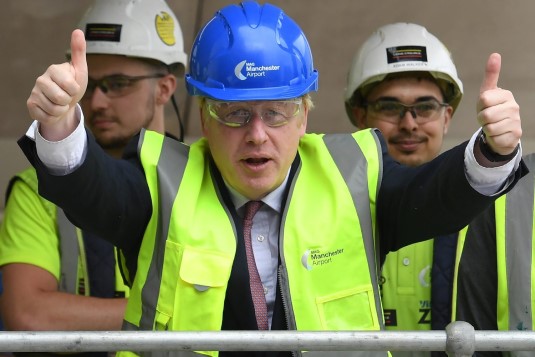
It is the case Johnson delivered on his main pledge and secured the most ruinous Brexit he could, there are side issues where promises were made and barefaced lies were told. The border in the Irish Sea currently reminding official politics of a past it would rather bury isn't supposed to exist, if you recall Johnson's selling of his deal 18 months ago. We've had promises about "levelling up", which so far means relocating a couple of hundred Treasury jobs from London to Darlington. He promised a pay rise for NHS workers, and then rowed back. And his commission on racial inequality was so appalling the UN were moved to condemn it.
The making and breaking of promises is usually the making and breaking of government, but Johnson and the Tories have got away with it so far. Yet why do they do it, and how has this persistent say-one-thing-and-do-another become such a feature of their politics? Well, there's the approach to Tory statecraft Johnson inherited from Dave and Theresa May. For the coalition years, the Tories lived from headline to headline, as obsessed about what the editorials were saying as Blair, Mandelson, and Campbell were in their day. For May, her approach to Brexit was driven by one overriding priority: keeping the Tories from disintegrating completely. Her twists and turns, painful defeats, repeated self-immolation, and eventually her resignation at least reflected the imbalances and shifts in the parliamentary party itself. Cirumstances imposed themselves. But what of Johnson? With an 80-seat cushion, all the institutional advantages, and a badly trailing opposition, why is he acting in a similar way and throwing out promises he has no intention of keeping like confetti?
Well, his record as London Mayor didn't depart from the formula, so you might put it down to personality as well as political inertia. But equally, there's a general paralysis. With Brexit done and the vaccine programme going well, the ghost of Tory futures is menacing proceedings and rattling its chains. For example, Johnson has his (on paper) programme of Tory modernisation with research budgets and tunnels to Ireland, but actually moving on his much evoked "priorities of the British people" is easier said than done. Consider some of their priorities, like developing an economy not over-reliant on low paid jobs. Or ensuring people can eat if they become unemployed. Or ending to evictions during the pandemic and action on landlords. Or the acceleration of house building, including freeing up councils to invest in building new stock. The Tories are absolutely nowhere because these harm the perceived and actual interests of their coalition, and so we're reduced to Johnson saying a lot while delivering very little. This is almost entirely politics as artifice, of policy produced for rhetoric's sake instead of the other way round. Of promising action in lieu of action, and hoping the overrepresented core support carry on voting Tory as they have done.
One of the advantages of this is the impression of busywork, even if it keeps kicking the can down the road. Contrary to the charges often levelled at the Tories for living in the past, they completely inhabit the moment, of preserving serenity now at the price of strife tomorrow. May's and Johnson's Brexit negotiating tactics were entirely subordinated to immediate concerns, and any problems arising can be dealt with later. And Johnson can now promise firm action on rebalancing the economy and committing the UK to ambitious emissions targets knowing it isn't likely he'll be the one doing the detailed work and negotiation of interests this requires. It's almost like there's a low-level war between present Tories and future Tories, of putting off and fighting shy of the inevitable. This cannot be ducked forever. There will come a time when they can no longer rely on their present coalition to get them into office, and as this support is purchased at the price of alienating everyone else, their viability as a party of government comes into question. For the moment, they're content with letting the long grass hide what lies in wait. And in Boris Johnson, the most dishonest, lazy, and most cynical Prime Minister in post-war British history, they have settled on a figure completely equal to their political procrastination.
Image Credit
No comments:
Post a Comment